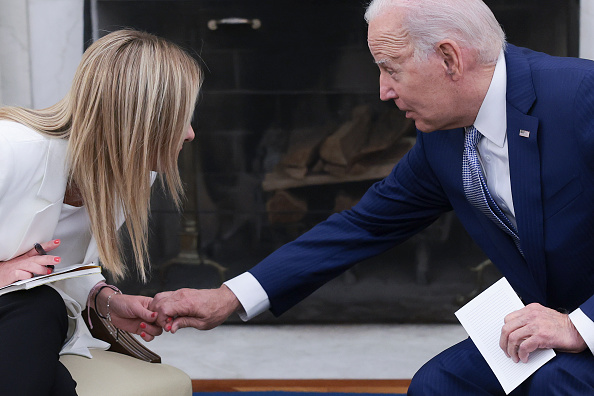Every time a populist-Right party is elected, the headlines are predictable. After Giorgia Meloni won in Italy, the headlines screamed about it being the first time a Western European country had elected the far-right since World War II. After Viktor Orbán’s party won their fourth election in a row in 2022, Brussels and the press shouted about how anti-democratic their victory was. The latest German elections have been no different: “AfD becomes first far-right party to win German state election since 1945,” blasted CNN. Some anchors on the network have thrown subtly to the wind and have drawn direct comparisons to the Nazi party.
The obviously-forced World War II connection aside, it is worth asking: why are these parties “far-right”? What makes one party far-right, another party centre-right, and another centrist? Or populist and not populist? As Brussels Signal’s Ralph Schoellhammer pointed out this week, the parties that got less than five per cent in the recent Thuringian elections are considered centrist – whilst the parties which nearly won a combined 50 per cent of the vote are considered extremists. Where does the centre actually lie?
People around the democratic world, and even the undemocratic world, often group themselves and their opponents into a left/right paradigm. This is descended from France’s revolutionary times. Members of the National Assembly who were on the side of the king sat on the right. Those who were opposed to the monarchy and wanted change sat on the left.
From there, it spread throughout the world, as it is – on the surface – a fairly easy way to organize political beliefs. Conservatives are on the right; the “more” conservative one becomes, the further right they get. The same goes for the left. But “more” here is a bit of a sticky word, as quantifying “more” is a bit of a fool’s errand. It is not a numeric system, where you can assign points where liking Spain’s Francisco Franco but not Italy’s Benito Mussolini gets you a certain amount of points on the scale.
It also becomes difficult when you factor in time and geography. The principles of the American Revolution – freedom of speech, religious belief, the press – at their time may have seemed extremely progressive. But those who propagated them also owned slaves. So could you call the American Founding Fathers “progressives?” They would likely not understand the word.
Geography too makes things difficult. Take the Austrian Freedom Party, which is normally called – or slurred – by the press as “far-right.” The Freedom Party is famously against allowing any migrant to come into the country, and would likely be happy with a border fence like Orbán’s Hungary. For this, they have been compared to Donald Trump’s Republicans. But they also support nationalized health care and are not leaping to make it easy to buy firearms, two positions which you would not find on any GOP policy platform page.
And one cannot get away with saying, “Ah, but being pro-gun is simply not in Europe.” Neighbouring Czechia, which is ruled by parties seen as much more moderate than the Freedom Party, operates under a “shall issue” gun carry permitting system – meaning that you need no special reason to carry a gun. Not only that, but the right of self-defence with a weapon is enshrined in the country’s constitution. So does that make the Freedom Party more moderate than their fellow Europeans?
One solution to this has been something propagated since the 1990s, called the “horseshoe theory” – the idea that the political spectrum, instead of being a straight line, is a horseshoe or circle. The “centre” would be at the bottom of the horseshoe, and eventually the left and right branch out and nearly come together. The argument goes that, at their extremes, left-totalitarianism is essentially the same as right-totalitarianism. The government of George Orwell’s 1984 is certainly totalitarian, but it has no distinguishing characteristics that could make it left-wing or right-wing. This argumentation infuriates partisans of either side, who would not prefer to see themselves as just steps away on the scale from their ideological others.
But this too suffers, as it places “centrism” at the, well, centre. Individuals like Emmanuel Macron and Angela Merkel were both labelled as centrists. While Merkel was seen as centre-right, she was still partially considered a centrist for her positions and the way she carried herself. But is it truly “centrist” to allow millions of migrants into your country over a period of a few years? Declaring essentially open borders to literally anyone who steps foot on the country’s soil is something which could be seen as extreme left, not centrist. But yet Merkel, for supporting such a policy, is a centrist – and the AfD, which opposes the policy, is considered extremist.
As the establishmentarians would have it, it is centrist to support open borders and extreme to oppose it. It is centrist to support every new progressive ideology and to fly the pride flag from government buildings and schools, and it is extremist to fly your own national flag. It is centrist to support giving Brussels as many powers as possible, and it is extremist to believe that nations should govern themselves. And it is centrist not to discuss these things but simply to accept them – and it is extremist publicly to question them. Never mind that most of these unquestionable things were centrist only twenty years ago.
It would seem, therefore, that the label of “centrist” simply serves to aid establishmentarians. It renders labelling a fait accompli: supporting existing power structures makes you centrist, and opposing them makes you extreme.
But this is nothing really new. Stability always has seemed centrist, and those who seek to overthrow stability have always seemed extreme. But the new thing is that, in the age of globalisation and liberal democracy, the establishmentarians have new ways and powers that they have never had before. A single judge can shut down one of the most popular social media sites in a country of over 200 million, as recently happened in Brazil. In America, six companies own nearly all of the media in the country. Governments throughout Europe are making it illegal to critique the ideological beliefs of those in power, from support for LGBT rights to migration.
The danger here is that, if establishmentarians increasingly make these arguments – “it is fascist to oppose unchecked migration,” “it is anti-democratic to oppose LGBT rights” – then eventually people are going to start taking them at their word. At the moment, voters who are fed up with the status quo are attempting to find democratic solutions by voting for parties like the AfD. But if establishmentarians make those solutions impossible, citizens will turn to other methods to make change. If people cannot use ballots, they will eventually use — well, maybe use bullets.
And if that happens, debates over where one lands on the democratic political spectrum might not matter that much anymore.





Viktor Orbán or Ursula von der Leyen? That is the choice facing Giorgia Meloni. Which way she goes could shape the future direction of Europe for a generation